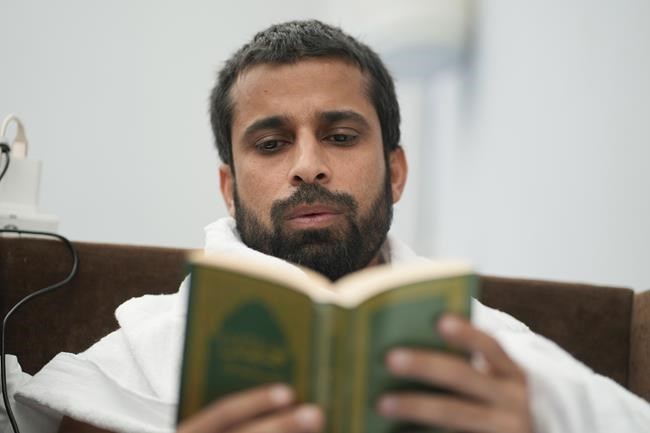
A Muslim pilgrim reads the Quran, the Muslims holy book, at the Mina tent camp, in Mecca, Saudi Arabia, during the annual hajj pilgrimage, Monday, June 26, 2023. Muslim pilgrims are converging on Saudi Arabia's holy city of Mecca for the largest hajj since the coronavirus pandemic severely curtailed access to one of Islam's five pillars. (AP Photo/Amr Nabil)
Republished June 26, 2023 - 12:04 PM
Original Publication Date June 26, 2023 - 12:56 AM
MINA, Saudi Arabia (AP) — Muslim pilgrims in Mecca circled the Kaaba, Islam's holiest site, and then converged on a vast tent camp in the nearby desert, officially opening the annual Hajj pilgrimage on Monday, returning to its full capacity for the first time since the coronavirus pandemic.
So far, more than 1.8 million pilgrims from all over the world have already amassed in and around Mecca for the Hajj, and the number was still growing as more pilgrims from inside Saudi Arabia joined, said a spokesman for the Saudi Hajj Ministry, Ayedh al-Ghweinim. Authorities have said they expect this year to approach pre-COVID levels of more than 2 million.
Egyptian businessman Yehya Al-Ghanam said he was at a loss for words to describe his feelings upon arriving at Mina, one of the biggest tent camps in the world outside Mecca, where pilgrims will stay for much of the Hajj.
“Tears will fall from my eyes out of joy and happiness,” he said. “I do not sleep. I have not slept for 15 days, only an hour a day,” overwhelmed by the emotions surrounding his pilgrimage.
The pilgrimage is one of the five pillars of Islam, and all Muslims are required to make the five-day Hajj at least once in their lives if they are physically and financially able to do it.
For pilgrims, it is a deeply moving spiritual experience that absolves sins, brings them closer to God and unites the world's more than 1.8 billion Muslims. Some spend years saving up money and waiting for a permit to embark on the journey.
The rituals during the Hajj largely commemorate the Quran's accounts of Ibrahim, his son Ismail and Ismail's mother Hajar.
Pilgrims have been doing the ritual circuit around the Kaaba since arriving in Mecca over recent days. As the last ones performed it Monday, the pilgrims made their way by foot or by bus to Mina.
In Mina, soldiers sprayed pilgrims with water to cool them down in the heat in the desert plain, where there is little respite from the blazing sun. The faithful set up in their tents, resting in the rows of cubicles and praying together to prepare for the coming rituals.
On Tuesday, pilgrims will move to Mount Arafat, a desert hill where the Prophet Muhammad is said to have delivered his final sermon. Afterwards, they collect pebbles from a site known as Muzdalifa to be used in the symbolic stoning of pillars representing the devil back in Mina. The final three days of the Hajj coincide with the festive Eid al-Adha holiday, when Muslims around the world slaughter livestock and distribute the meat to the poor.
In 2019, more than 2.4 million pilgrims participated in the Hajj. In 2020, amid worldwide coronavirus lockdowns, Saudi Arabia limited the pilgrimage to a few thousand citizens and local residents. Last year, just under 900,000 attended as Saudi Arabia allowed limited numbers of pilgrims from abroad.
News from © The Associated Press, 2023